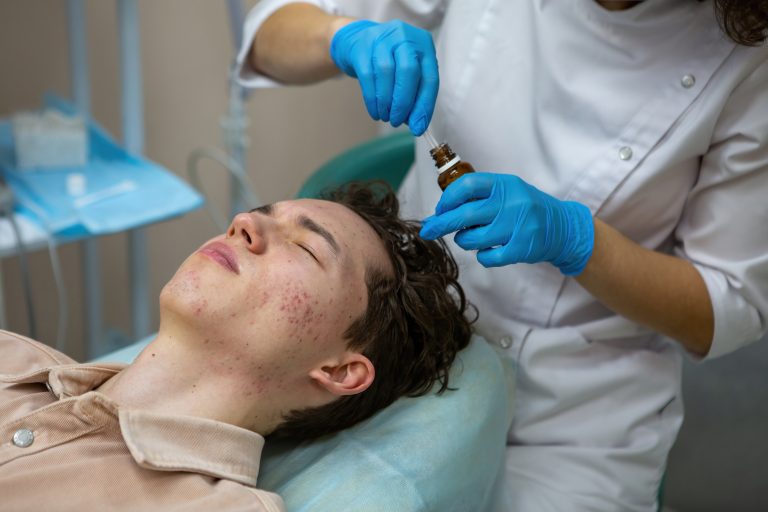What is Acne?
Acne vulgaris or acne is the most common skin condition that affects teenagers and adults of all ages. It can appear on the face, back, and chest. You do not need to suffer and let acne “run its course.” Acne is treatable, and numerous options exist! Routine medical cleansing treatments are the first step to control regular breakouts. Each patient will have a customized treatment program designed to target his or her specific acne, skin type, and lifestyle. Regardless, of whether you get the occasional pimple or painful, cystic acne, we can create a successful treatment plan to help you get clear!
Types of Acne
- NON-INFLAMMATORY: unlikely to lead to scarring
- Comedones: may be open (blackheads) or closed (whiteheads)
- Blackheads occur when hair follicles are partially blocked by oil, bacteria, and dead skin cells. They take significantly longer to clear and frequently require skin condition surgery or extraction.
- Whiteheads occur when pores are completely blocked. They resolve more quickly.
- Comedones: may be open (blackheads) or closed (whiteheads)
- INFLAMMATORY: inflamed pores which may be infected and can lead to scarring.
- Pustules: (pimples or zits) occur as the result of clogged pores. They are red, tender bumps and come to a head
- Papules: red and tender bumps, but do not have a head.
- Cysts or nodules: a more severe form of acne. They are large, painful bumps under the skin’s surface. Nodules usually cause acne scarring.
Causes
All types of acne occur when pores or hair follicles on the face, neck, chest, or back become clogged with excess or trapped sebum (oil), dead skin cells, or built-up bacteria.
- Naturally oilier skin
- Genetically prone to acne
- More exposure to acne-causing bacteria
- Hormones during the onset of puberty, menstruation, pregnancy, and hormonal birth control methods may trigger acne breakouts
- Certain skincare product ingredients: may worsen acne
- Dietary factors (protein supplements, dairy, high-starch foods): may worsen acne
Acne Treatment
Treating acne is a relatively slow and stepwise process. Patience is key since there is no overnight remedy. Each patient will have a customized treatment plan depending on their acne type and severity, location, skin type, and lifestyle. Some of the most popular and effective acne treatment options include:
- Benzoyl Peroxide: reduces the blockages in the hair follicles.
- Oral and Topical Antibiotics: Treat any infection in the pores.
- Hormonal Treatments: used for adult women with hormonally induced skin conditions.
- Retinoids (Retin-A, Tretinoin, Differin, etc.): derivatives of Vitamin A that help unplug the blocked-up material in whiteheads and blackheads,
- Extraction (Acne Surgery): removal of blackheads by using a small metal tool to unclog the blocked pores.
Results are further enhanced when you add our acne-clearing cleansers and lotions for routine use at home. It is essential for patients not to pick or scratch at individual lesions because it can make them inflamed and can lead to long-term scarring. Once your breakouts are controlled, additional acne scar and dark spot treatments may be started to further improve the appearance of your skin. This may include cosmetic procedures, such as acne peels, micro-needling, etc.
For more information about Acne, view some of our articles.

